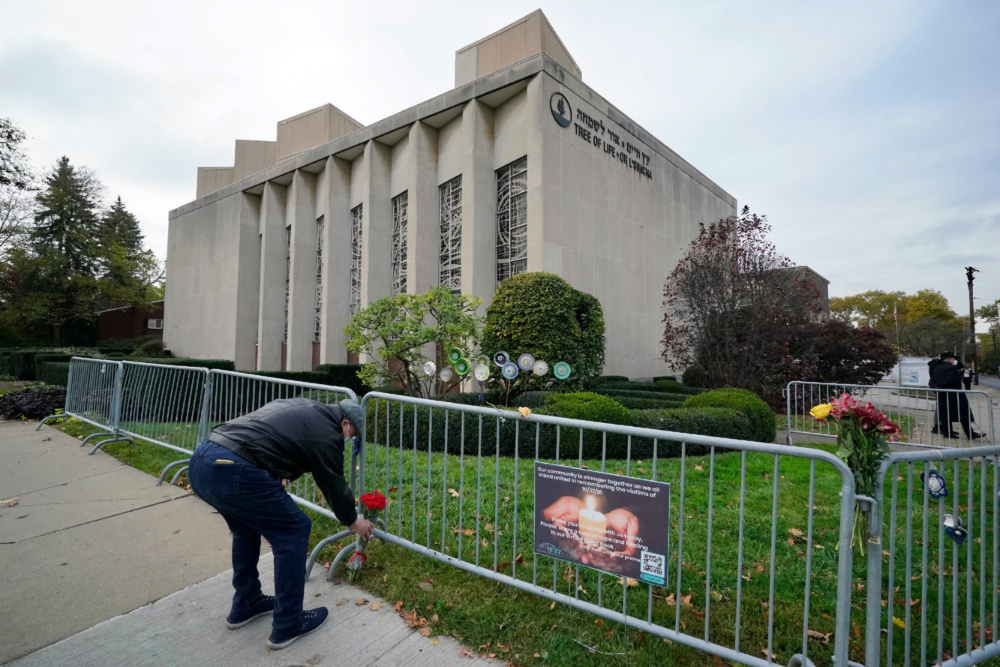The Jewish congregation that once gathered in the Tree of Life Synagogue in Pittsburgh’s Squirrel Hill neighbourhood is inching forward with a plan to repurpose its building, two years after an attacker shot and killed 11 Jews in an anti-Semitic rampage.
On Wednesday, the congregation named a raft of celebrities who have signed on to a fundraising campaign to rebuild at the corner of Wilkins and Shady Avenues. The existing building, the site of the deadliest anti-Semitic attack in American history, has stood empty since the attack.

A man places flowers outside the Tree of Life synagogue in Pittsburgh on Tuesday, 27th October, the second anniversary of the shooting at the synagogue, that killed 11 worshippers. PICTURE: AP Photo/Gene J Puskar/File photo.
The honorary fundraising team includes actors Tom Hanks and Billy Porter, Pennsylvania Governor Tom Wolf, Pittsburgh Mayor William Peduto and Joanne Rogers, the widow of “Mister” (Fred) Rogers, a longtime Pittsburgh resident.
Hanks played Mr. Rogers in the 2019 drama, A Beautiful Day in the Neighborhood. Porter is best known for his role in the Broadway musical Kinky Boots. He grew up in Pittsburgh and attended Taylor Allderdice High School in Squirrel Hill.
The team will work alongside congregational leaders to solicit funding for a yet-unspecified project. The congregation has not determined whether it will reconfigure the Brutalist-style synagogue building with its exposed concrete exterior or raze it and start from scratch.
“When you get to be 92, there’s not much you can do,” said Joanne Rogers, the widow of Fred Rogers, whose children’s television series Mister Rogers’ Neighborhood was produced in Pittsburgh. “I explained that to the rabbi. And he said, ‘Joanne, we just want your heart in it.’ And I said, ‘Great. It’s there.’”
Rogers said she and her husband lived three blocks from the synagogue during much of the period when the TV show was taped and that she feels she is representing her husband on the fundraising team. Both felt that the synagogue was a “good and loving neighbour,” she said.
Rabbi Jeffrey Myers, who has led the 200-family-member congregation for the past three years, said the congregation took a year to grieve its dead and another year in structured listening groups to decide what to do next.
Until the outbreak of the coronavirus, the congregation had been meeting at Rodef Shalom, a large Reform synagogue that straddles the nearby Oakland and Shadyside neighbourhoods. Since Rodef Shalom went online in March, Myers has led services online from his living room.
The congregation opted not to return to the building as it is, with several indoor areas pockmarked with bullet holes. But neither has it decided how it wants to rebuild. The building’s core dates to 1952, and Myers suggested it has outlived its usefulness.
“We’ll seek out architects who can take and transform all the data from the focus groups and help us create a vision,” Myers told Religion News Service.
The site has been closed since the days following the 27th October, 2018 massacre. A chain-link fence surrounds the building, draped with a tarp that has become a kind of canvas with pictures, artwork, flowers and notes of condolence, some faded over time.
Whatever architectural plan emerges for the building, the congregation has made clear it will want to include a memorial to the dead and perhaps exhibition space for The Holocaust Center of Pittsburgh or a yet-unnamed anti-hate campaign.
But Barbara Burstin, a historian of the Pittsburgh Jewish community who teaches the subject at Carnegie Mellon and other Pittsburgh-area universities, said she hopes the congregation won’t limit itself to memorialising the dead.
“I think this is an opportunity to inform visitors – and there will be visitors – about living Jews, about the contributions Jews have made to Pittsburgh and the general community and about some of the tenets of the religion these people have embraced,” Burstin said.
“There needs to be a balance to the theme of Pittsburgh as a place of death and victimization with the notion of Pittsburgh as having a vibrant Jewish community.”
The accused shooter, Robert Bowers, has been described as a white nationalist, a follower of far-right fringe groups with anti-Jewish, anti-immigrant sentiment.
Prosecutors say Bowers stormed the synagogue at the start of Saturday morning services, spewing anti-Semitic invectives against Jews and the immigrants they advocated for. He has pleaded not guilty to a 63 count indictment. No trial date has been set.
Not all 11 Jews killed in the shooting were members of the Tree of Life. Two other Jewish congregations – Dor Hadash, a Reconstructionist congregation, and New Light Congregation, a Conservative congregation – rented space in the building.





